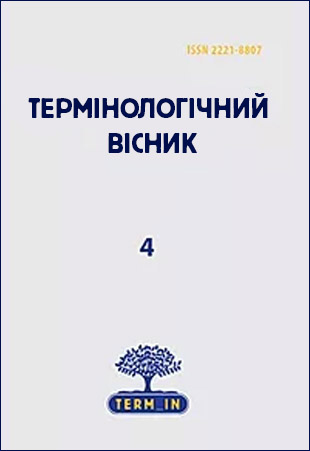Development of Methodology of Modern Linguistic

Founders
National Academy of Sciences of Ukraine,
Institute of Ukrainian Language of NAS
Publisher
Institute of the Ukrainian Language of National Academy of Sciences of Ukraine
Scientific journal Ukrainian Language is registered by the Ministry of Justice of Ukraine as print media (Certificate: Series КВ № 12180 – 1064 ПР of January 12, 2007).
Included in the list of printed scientific specialized editions of Ukraine (Order of MES of Ukraine no528 from 12.05.2015)
Back side of the journal
Siergiej Grinev
Information about the author: Doctor of Philology, Professor of State Higher Professional School in Suwalki (Suwalki, Poland)
e-mail: svgrinev1@gmail.com
Title: Development of Methodology of Modern Linguistic
Rubric: Theory and History of Terminology
Abstract: The paper discusses the history of terminology science from the point of view of evolution of methods of terminological research and ordering terminologies. Stages of development of terminology science are associated with predominant usage and perfecting of particular approaches – systemic, semiotic, parametric, typological, diachronic and anthropolinguistic – which makes it possible to view the history of terminology science as history of development of methods of investigating special vocabulary.
Systemic approach to viewing terminology is based, firstly, on the principle that every science is founded on a system of concepts and may be represented as such, and, secondly, on the fact that the meaning of every word is defined by its lexical surrounding. Therefore the objects of study in terminology are not separate terms but terminologies.
Semiotic approach was first applied to characteristics of term viewed as a sign and then was extended to classifying terminolog7ies and their features. This approach made it possible not only to group terminological characteristics into semantic, formal and functional but also to discover other aspects of sign, such as their evolution and structure.
At the end of the 1970-s a new, parametric approach started to be used in describing and analysing special vocabulary. The concept of terminological parameter was defined as a measurable characteristics showing a degree of manifestation of a certain feature.
Introducing parametric approach to describing and comparing terminologies enabled terminologists to evaluate the existing state of terminological research and realise the need to turn from uncoordinated separate investigations to unified efforts to discover the most typical basic features of terminologies of various languages and branches of knowledge and terminology in general. Thus were elaborated typological methods of terminological research.
Practical needs to perfect the process of translating terms enhanced comparative terminological studies. It was found that comparing terminologies of various languages presented in systemic way makes it possible to establish the exact terminological equivalents and discover the drawbacks of the existing translating dictionaries. 9 The need to predict the ways of development of terminologies lead to understanding the importance of diachronic analysis of various terminologies. The next step in building awareness of the possible ways in development of terminologies was elaboration of anthropolinguistic approach to terminological research, which is characterised by trying to find the historical causes for changes in human mind as reflected in respective changes in vocabulary. As the result of elaborating, testing and applying various approaches to terminological studies at present we have created ample opportunities to analyse, correct and regulate further development of special vocabulary.
Keywords: history of terminology science, terminological methods, semiotics, terminological parameters, typology, reversibility, anthropolinguistics.
References:
- Veselov, P.V. (1970). Struktura termina v aspekte semiotiki. Mesto terminologii v sisteme sovremennyh nauk (pp. 20–29). Moscow (in Rus.).
- Vinokur, G.O. (1939). O nekotoryh yavleniyah slovoobrazovaniya v russkoj tekhnicheskoj terminologii. Trudy MIFLI. Vol.V, 3–54 (in Rus.).
- Grinev, S.V. (1985). Voprosy parametrizacii opisaniya terminologicheskoj leksiki. Teoreticheskie problemy nauchno-tekhnicheskoj terminologii i praktika perevoda (pp.43–44). Omsk (in Rus.).
- Grinev, S.V. (1988). Parametricheskij metod ocenki terminologij. Nauchno-tekhnicheskaya terminologiya. Vyp. 3, 5–9 (in Rus.).
- Grinev, S.V. (1993). Vvedenie v terminovedenie. Moscow: Izd-vo MGU (in Rus.).
- Grinev, S.V. (1997). Sopostavitel’noe terminovedenie – osnova mezhdunarodnoj unifikacii i standartizacii terminologij. Nauchno-tekhnicheskaya terminologiya, Vyp. 2, 28–4 (in Rus.).
- Grinev, S.V. (1998). Istoricheskij sistematizirovannyj slovar’ terminov terminovedeniya [uchebnoe posobie]. Moscow (in Rus.).
- Grinev, S.V. (2000). Osnovy semiotiki. Moscow (in Rus.).
- Grinev, S.V. (2016). K voprosu o povyshenii kachestva perevodnyh slovarej v ramkah sopostavitel’nogo terminovedeniya. Naukova termіnolohіia novoho stolіttia: teoretychnyi i prykladnyi vymiry: Materіaly Mіzhnarodnoi nauk. konf. (Rіvne, September 15–16, 2016) (pp. 26–36). Rіvne: NUVGP (in Rus.).
- Zhadejko, M.N. (2008). Antropolingvisticheskie aspekty polisemii somatizmov [Synopsis of PhD thesis]. Nizhnij Novgorod (in Rus.).
- Karaulov, Yu.N. (1981). Lingvisticheskoe konstruirovanie i tezaurus literaturnogo yazyka. Moscow (in Rus.).
- Kuz’min, N.P. (1970). Normativnaya i nenormativnaya special’naya leksika. Problemy i metody normalizacii special’noj leksiki. Lingvisticheskie problemy nauchno-tekhnicheskoj terminologii (pp. 68–81). Moscow (in Rus.).
- Lejchik, V.M. (1971). Predmet i mesto nauki terminologii. Aktual’nye problemy leksikologii (pp.3–5). Novosibirsk (in Rus.).
- Lejchik, V.M., Smirnov, I.P. & Suslova, I.M. (1977). Terminologiya informatiki: teoreticheskie i prakticheskie voprosy. Itogi nauki i tekhniki. Seriya “Informatika”. Moscow (in Rus.).
- Lotte, D.S. (1961). Zadachi i metody raboty po uporyadocheniyu tekhnicheskoj terminologii. In Lotte, D.S. (1961). Osnovy postroeniya nauchno-tekhnicheskoj terminologii (pp.7–18). Moscow (in Rus.).
- Mironova, E.E. (2001). Sopostavitel’nyj sistemnyj analiz anglijskoj i russkoj leksiki (na materiale leksiki arhitekturnyh konstrukcij) [Synopsis of PhD thesis]. Moscow (in Rus.).
- Fadeeva, L.Yu. (2005). Antropolingvisticheskoe issledovanie yavleniya reversivnosti v special’nom pole [Synopsis of PhD thesis]. Nizhnij Novgorod (in Rus.).
- Hayutin, A.D. (1970). O “terminah” i “terminoidah”. Tezisy dokladov po romano-germanskoj filologii (Vol.1, pp.16–17). Samarkand (in Rus.).
- Grinev, S.V. (1979). Compiling a Thesaurus. Fachsprache, No.4, 154–161.
- Junge, H.D., Lukhaup, D. (1991). Civil Engineering and Architecture: English-German; Deutch-Englisch. Bauwesen und Architektur. Berlin: Ernst.


